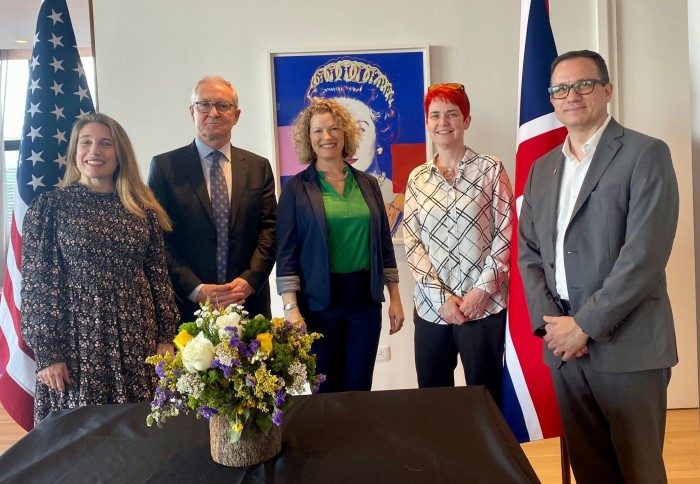Imperial and Cornell University to cooperate on AI in scientific discovery

Leaders from Imperial and Cornell announced the new partnership at the British Consul General's Residence in New York
Imperial and Cornell University have formed a new partnership to cooperate on using AI to accelerate scientific discovery and future technologies.
The partnership will create a bridge between world-leading AI centres in London and New York to revolutionise the way scientists carry out research and solve the world’s biggest challenges.
Imperial and Cornell will work together to explore ways the technology could be used in scientific and engineering research to improve analysis, increase automation and ultimately lead to faster scientific discoveries.
The Transatlantic AI in Science Network will link the AI in Science programmes of Imperial’s I-X and Cornell’s AI for Science Institute through exchanges and collaborations in AI. It will bring together some of the most talented scientists in AI to work with industry, government, funders and other partners on both sides of the Atlantic.
The UK and US agreed in 2021 to strengthen ties in science and technology as part of a new Atlantic Charter. This includes a commitment to combine expertise in AI and emerging technologies.
Professor Mary Ryan, Vice Provost (Research and Enterprise) at Imperial College London, said: "This ambitious partnership brings together two of the world’s leading universities in AI and will help accelerate scientific discovery for the benefit of society. Imperial and Cornell have a successful history of working together to develop and translate radical technologies and making significant scientific advances. If we are to find solutions to the world’s greatest challenges we need to equip scientists with the necessary tools and mechanisms for to achieve their bold and ambitious ideas.”
Professor Krystyn Van Vliet, Vice President for Research and Innovation at Cornell University, said that Imperial and Cornell are both committed to developing the next generation of researchers and scientists through academic collaboration. “Our partnership will enable us to leverage the strengths of our two universities. Bringing together AI scientists and scholars in other key disciplines – for example, in materials or physics or biology or sustainability sciences – can catalyze radical collaborations that develop and translate AI-related solutions motivated by societal need and impact.”
Imperial and Cornell are recognised as two of the world’s top universities in AI and were among nine universities to receive large AI in Science grants from Schmidt Futures last year as part of a $148m global initiative.
The Eric and Wendy Schmidt AI in Science Fellowship, a program of Schmidt Futures, will develop future leaders in AI. Some are already working on projects such as using AI to enhance mathematical discovery, monitor crop droughts, develop robotic automation in neuroscience, create improved materials for solar energy and carry out precise Higgs boson measurement.
The initiative will fund up to 20 independent fellows at Imperial each year for up to six years, supporting them to learn and apply AI methods to their research. The Fellowships at Imperial will be embedded in I-X, a major new Imperial initiative based at the College’s White City Campus.
The new partnership was announced at the British Consul General's Residence in New York, hosted by Emma Wade-Smith, His Majesty’s Trade Commissioner for North America and HM Consul General New York.
I-X
Earlier this year Imperial launched a major new initiative, I-X, which will use artificial intelligence and data science to tackle global challenges.
I-X harnesses the College’s long-standing excellence in AI machine learning, data sciences and the many fields in science, engineering, medicine and business where they are applied.
Its projects include developing new computational tools for improving image-based detection and diagnosis of disease, using AI to direct the design and implementation of new biological systems, and intelligent systems and networks for monitoring, control, and security of critical infrastructure. Other fields of research include human-AI cooperation, robotics and automation, and machine learning systems that understand the real world, such as self-driving vehicles.
I-X's innovative research programme aims to deliver ambitious scientific ‘moonshots’ in the next 5-10 years. This will be achieved by bringing together multidisciplinary academic teams from across Imperial with companies and non-profit labs to solve problems that they cannot solve alone.
Professor Nick Jones, co-Director of I-X, said: "AI can clearly accelerate scientific research from mathematics, through design, to biology. Creating opportunities for the most talented AI scientists from the UK and USA to share ideas and knowledge will ensure all our efforts sit at the cutting edge.”
Imperial and Cornell
Imperial is one of Cornell’s Global Hubs partners. The universities collaborate in various programmes such as seed funds, student exchanges and Global Challenge Labs to address broad societal issues such as climate change.
Imperial and Cornell also have a joint education seed fund. The fund encourages projects that combine expertise and efforts across Imperial and Cornell to jointly develop new teaching, learning and student experience opportunities. Applications for the education seed fund are now open.
Article text (excluding photos or graphics) © Imperial College London.
Photos and graphics subject to third party copyright used with permission or © Imperial College London.
Reporter
Stephen Johns
Communications Division